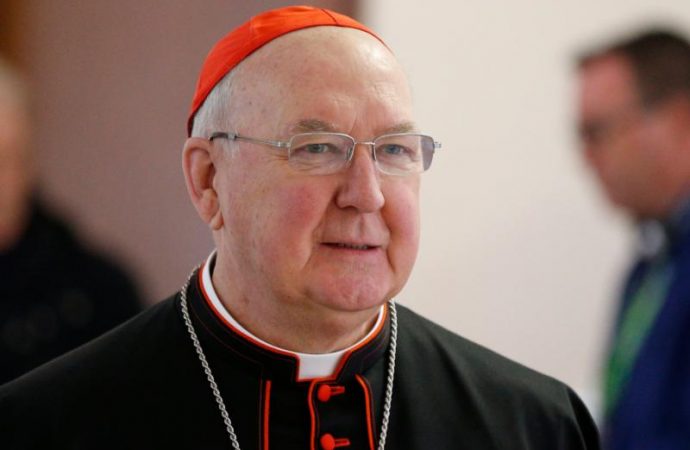In what’s likely to be seen as a papal vote of confidence, Pope Francis tapped American Cardinal Kevin Farrell Thursday as the new camerlengo, a position responsible for administering the Vatican after a pope dies or resigns and before a new one is elected, despite question marks about Farrell’s role in the scandals surrounding ex-Cardinal Theodore McCarrick.
Tapped by Pope Francis in 2016 as the head of the Vatican department for Laity, Family and Life, Farrell has taken on a leading role in Francis’ reform of the Roman curia and has been a key voice in several major Vatican gatherings, including the August 2018 World Meeting of Families in Dublin, the October 2018 Synod of Bishops on youth, and the January 2019 global World Youth Day in Panama.
The former bishop of Dallas, Farrell is generally perceived as aligned with Francis’ stance on doctrinal matters, including his controversial 2016 apostolic exhortation, Amoris Laetitia.
In his new position as the Vatican’s camerlengo, or “chamberlain,” Farrell has been entrusted with managing Vatican affairs during a papal interregnum - a move that further cements impressions that he enjoys the pontiff’s trust.
He will take over for French Cardinal Jean Louis Tauran, who died in July 2018 after a long battle with Parkinson’s disease.
While the camerlengo oversees general Vatican affairs, his power is limited, having just enough authority to keep things running, but they have no power to make definitive decisions reserved to the pope himself.
The camerlengo is among the few officials in the Vatican who keeps his office during a sede vacante, or interregnum, as his primary task is to arrange the funeral of the previous pope and organize events leading up to the conclave that will elect a new one.
The pope’s move comes despite the fact that Farrell has come under fire since scandals surrounding American ex-Cardinal Theodore McCarrick last summer, including sexual abuse of a minor and sexual harassment of seminarians and young priests.
Prior to his appointment as archbishop of Dallas, Farrell in 1984 had been a priest for the archdiocese of Washington, where McCarrick served as archbishop from 2000 until his retirement in 2006. Shortly before McCarrick stepped on board, Farrell was named vicar general for the archdiocese, and in 2001 he was tapped as an auxiliary bishop for Washington, where he stayed until his appointment to Dallas in 2007.
Despite repeated denials that he knew about McCarrick’s misdeeds or that he had at least heard rumors, Farrell has faced increasing pressure from those who insist that given his proximity to McCarrick, he had to know something.
In an interview with Catholic News Service in July 2018, Farrell said he had never met McCarrick until the latter was named archbishop of Washington, and that he was ”shocked” when abuse allegations came out last summer.
“I worked in the chancery in Washington and never, no indication, none whatsoever,” Farrell said. “Nobody ever talked to me about this and I was involved, heavily involved,” in investigating and cases of clerical sexual abuse for the Archdiocese of Washington, particularly in wake of the implementation of the U.S. bishops’ 2002 Dallas Charter on child protection.
“I was shocked, overwhelmed; I never heard any of this before in the six years I was there with him,” Farrell said.

